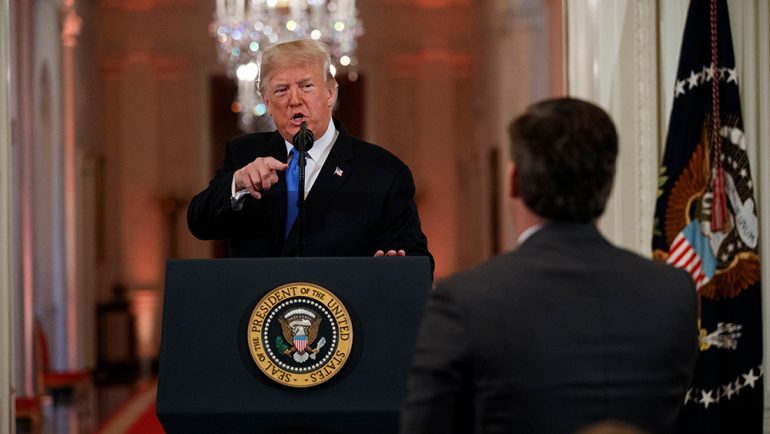White House Fully Restores Jim Acosta’s Press Pass
By Ted Johnson
LOS ANGELES (Variety.com) – WASHINGTON — The White House has fully restored correspondent Jim Acosta’s hard pass, ending high stakes litigation that could have determined the extent to which the president controls access by the media.
“Having received a formal reply from your counsel to our letter of November 16, we have made a final determination in this process: your hard pass is restored,” the White House said in a letter to Acosta on Monday afternoon and published by CNN . “Should you refuse to follow these rules in the future, we will take action in accordance with the rules set forth above. The President is aware of this decision and concurs.”
“Today the @WhiteHouse fully restored @Acosta’s press pass,” the CNN public relations account wrote. “As a result, our lawsuit is no longer necessary. We look forward to continuing to cover the White House.”
If the White House were to seek again to pull the hard pass, it would have required the administration to first ask a federal judge to lift a court order. CNN won a temporary restraining order on Friday to at temporarily restore Acosta’s pass. U.S. District Judge Timothy Kelly on Friday ruled that the White House failed to follow due process when they revoked his credentials hours after a contentious press conference on Nov. 7.
Over the weekend, it looked as if the White House would attempt to revoke Acosta’s pass again by proving to the judge that they had followed due process.
Press Secretary Sarah Huckabee Sanders and Deputy Chief of Staff Bill Shine sent a letter to Acosta on Friday evening informing him that they had preliminarily decided to revoke his credential, with a final decision to be made on Monday. CNN’s legal team objected to the move, calling it retroactive and based on non-existent written standards of conduct. They sought an emergency court hearing.
The Trump administration also outlined a written set of guidelines for reporters at press conferences:
(I) A journalist called upon to ask a question will ask a single question and then will yield the floor to other journalists;
(2) At the discretion of the President or other White House official taking questions, a follow-up question or questions may be permitted; and where a follow-up has been allowed and asked, the questioner will then yield the floor;
(3) “Yielding the floor” includes, when applicable, physically surrendering the microphone to White House staff for use by the next questioner;
(4) Failure to abide by any of rules (1)-(3) may result in suspension or revocation of the journalist’s hard pass.
The Trump administration claimed that Acosta disrupted the press conference when he refused to stop trying to ask a followup question to the president. Trump called him “rude,” and Acosta initially declined to hand his microphone over to a White House intern when she attempted to grab it from him.
In the aftermath, Trump derided what he said was a lack of “decorum,” and over the weekend said that rules were being put in place. But in a hearing last week, CNN’s lead attorney Ted Boutrous said that it was the president who “set the tone” at the press conference, and it was he who contributed to its raucous atmosphere by interrupting reporters and, in some cases, berating them.
Sanders said that they issued the written guidelines “with a degree of regret,” but she and Shine blamed CNN and Acosta for forcing the issue.
“We would prefer to continue hosting White House press conferences in reliance on a set of understood professional norms, and we believe the overwhelming majority of journalists covering the White House share that preference,” Shine and Sanders wrote in their letter on Monday. “But, given your insistence that shared practices be replaced by ‘explicit…standards,’ this letter attempts to convert into rules the widely understood practices described in our prior letter, and which your counsel inexplicably concludes were non-existent.”
Shine and Sanders also held out the possibility of a more extensive code of conduct.
They added that “the view from here is that White House interaction with the press is, and generally should be, subject to a kind of natural give and take. President Trump believes strongly in the First Amendment and interacts with the press in just such a way. It would be a great loss for all if, instead of this give and take, and instead of relying on the professionalism of White House journalists, we were compelled to devise a lengthy and detailed code of conduct for White House events.”
The rules, though, already are drawing criticism from some Washington reporters.
Todd Gillman, the Washington bureau chief for the Dallas Morning News, wrote that “there is now a threat to ban reporters from the White House for asking a follow up question without permission even once.”
Chris Geidner, legal editor for BuzzFeed News, said “these rules would enable any even half-competent speaker to avoid answering any and all questions posed to them by the press. The @WHCA should strongly oppose this move by the White House.”
Olivier Knox, the president of the White House Correspondents Association, said that the White House “did the right thing in restoring ’s hard pass.”
Of particular concern is the rule on asking follow up questions.
“The White House Correspondents’ Association had no role in crafting any procedures for future press conferences,” he said. “For as long as there have been White House press conferences, White House reporters have asked follow-up questions. We fully expect this tradition will continue. We will continue to make the case that a free and independent news media plays a vital role in the health of our republic.”

